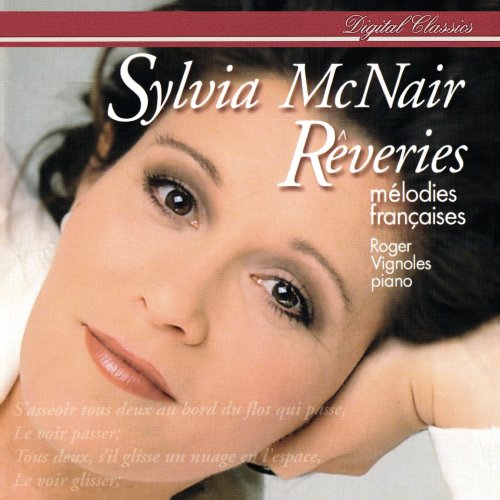
Sylvia McNair, Roger Vignoles - Rêveries: Mélodies françaises (1997)
BAND/ARTIST: Sylvia McNair, Roger Vignoles
- Title: Rêveries: Mélodies françaises
- Year Of Release: 1997
- Label: Philips
- Genre: Classical
- Quality: FLAC (tracks)
- Total Time: 59:07
- Total Size: 236 Mb
- WebSite: Album Preview
Tracklist:
Claude Debussy (1862-1918), Ariettes Oubliées
1. C'est L'extase Langoureuse 3:01
2. Il Pleure Dans Mon Coeur 2:40
3. L'ombre Des Arbres Dans La Rivière Embrumée 2:42
4. Paysages Belges: Chevaux De Bois 3:11
5. Aquarelles: I. Green 2:10
6. Aquarelles: II. Spleen 2:27
Georges Bizet (1838-1875)
7. La Coccinelle 4:39
8. Adieux De L'hôtesse Arabe 4:48
9. Pastel 3:51
10. Vous Ne Priez Pas 5:05
Olivier Messaien (1908-1992), Trois Mélodies
11. 1. Pourquoi 2:09
12. 2. Le Sourire 1:37
13. 3. La Fiancée Perdue 2:42
Gabriel Fauré (1845-1924)
14. Rêve D'amour 2:35
15. Au Bord De L'eau 2:11
16. Notre Amour 1:43
Francis Poulenc (1899-1963)
17. Bleuet 3:26
Banalités
18. 2. Hôtel 2:13
19. 4. Voyage À Paris 0:58
Métamorphoses
20. 1. Reine Des Mouettes 1:07
21. 2. C'est Ainsi Que Tu Es 2:38
22. 3. Paganini 1:10
Claude Debussy (1862-1918), Ariettes Oubliées
1. C'est L'extase Langoureuse 3:01
2. Il Pleure Dans Mon Coeur 2:40
3. L'ombre Des Arbres Dans La Rivière Embrumée 2:42
4. Paysages Belges: Chevaux De Bois 3:11
5. Aquarelles: I. Green 2:10
6. Aquarelles: II. Spleen 2:27
Georges Bizet (1838-1875)
7. La Coccinelle 4:39
8. Adieux De L'hôtesse Arabe 4:48
9. Pastel 3:51
10. Vous Ne Priez Pas 5:05
Olivier Messaien (1908-1992), Trois Mélodies
11. 1. Pourquoi 2:09
12. 2. Le Sourire 1:37
13. 3. La Fiancée Perdue 2:42
Gabriel Fauré (1845-1924)
14. Rêve D'amour 2:35
15. Au Bord De L'eau 2:11
16. Notre Amour 1:43
Francis Poulenc (1899-1963)
17. Bleuet 3:26
Banalités
18. 2. Hôtel 2:13
19. 4. Voyage À Paris 0:58
Métamorphoses
20. 1. Reine Des Mouettes 1:07
21. 2. C'est Ainsi Que Tu Es 2:38
22. 3. Paganini 1:10
In Rêveries, Sylvia McNair and Roger Vignoles present a comprehensive survey of French mélodies, thoughtfully chosen and tastefully performed. Ranging from the late nineteenth to the early twentieth century, these selections are representative of the delicate and often introspective art songs written by the leading French composers of the period. Claude Debussy's impressionistic Ariettes oubliées establish a languorous mood that lasts for most of the program. Of these six numbers, only the lively "Paysages Belges" provides enough contrast to briefly lift the spell. The four Bizet songs by included are not exceptional pieces, though Adieu de l'hôtesse arabe is the most interesting of the group for its exoticism and inventive harmonic exploration. Olivier Messiaen's subjective Mélodies are simple settings of rather slender lyrics and are perhaps the least satisfying of the songs offered here. Gabriel Fauré's three songs are sentimental and richly harmonized, characteristic of fin-de-siècle expression and taste, though refined and free of gaudiness. The last six songs are fine examples of Francis Poulenc's melodic gifts, sophistication, and wit. The humorous Voyage à Paris is cast in a popular chanson style, and the three surrealistic Métamorphoses bring the program to a close with an ironic but light touch.
As a ISRA.CLOUD's PREMIUM member you will have the following benefits:
- Unlimited high speed downloads
- Download directly without waiting time
- Unlimited parallel downloads
- Support for download accelerators
- No advertising
- Resume broken downloads


